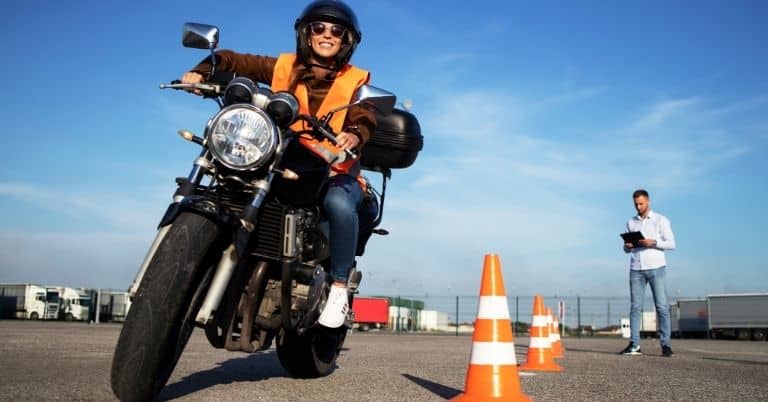
Request Free Consultation
To get answers to questions about your injury, contact Catalano Law for a FREE case evaluation. We’ll assess your case, explain your legal options, and recommend the next steps at no cost. We’re here when you need us.
Contact Form
General Contact Form

Motorcycles evoke a sense of freedom and adventure. Unfortunately, bikes also pose a significant danger to the rider due to their small size and lack of protection. In 2020, 3,543 motorcycle crashes resulted in injuries, and 181 resulted in fatalities in New York.
New York law does sets requirements for getting a motorcycle license, but the state doesn’t require you to take a class to get a motorcycle license. That said, operating a motorcycle is challenging and requires hours of practice to hone your skills.
Read on to learn more about the motorcycle laws in New York and how classes can help you avoid an accident.
Motorcycle Law
In the state of New York, new riders are required to get a Class M or an MJ motorcycle learner’s permit. You must take a written test at the DMV to obtain your permit. You can study for this test using the online NYS Motorcycle Operator’s Manual.
New York’s motorcycle laws don’t require you to take a class, but liability insurance is required to cover property damage and bodily injuries in case of an accident. All motorcyclists must carry liability insurance to legally ride on public roads.
Anyone who rides on a motorcycle, including passengers, must wear an approved helmet, and operators must wear approved eye protection, even if their bike has a windshield. Riders must always use a headlight and taillight when driving at night.
Bikers may ride two abreast in one lane but may not share the lane with any other type of vehicle and are subject to all applicable traffic laws.
Motorcycle owners must take their bike to get inspected annually at a licensed station.
Why You Should Consider a Motorcycle Class
Motorcycle courses familiarize beginner riders with their bikes and how to operate the vehicle safely. In New York, you can take the Motorcycle Safety Foundation’s Motorcycle Basic RiderCourse® for beginner information. If you have a driver’s license already and a motorcycle learner’s permit, passing this course allows you to skip the skills test at the DMV when you go to get your motorcycle license. To qualify, you must take the course from an approved trainer in New York State.
Learning Your Bike
The first step in any beginner’s course covers:
- Pre-ride inspection
- Identification of essential controls and major parts
- Mounting and dismounting procedures
- Good riding posture
You can ensure you don’t overlook any critical elements during your pre-ride inspection by using the acronym T-CLOCS.
- T: Tires and Wheels
- C: Controls
- L: Lights and Electrical
- O: Oil and Fluids
- C: Chassis
- S: Sidestand
The Basics of Starting and Stopping
A motorcycle course will teach you the friction zone and how it helps you ride safely. It also teaches safe starting, stopping, and gear shifting. You will work on these essential skills to improve your maneuverability at low speeds, because they can be complex for beginners to master.
Leaning to Turn and Stopping Distance
You will learn how to initiate and adjust a lean using handgrip pressure and handlebar movement. The instructor will teach you how to brake quickly without skidding and make tight turns from a stop, such as turning right at a stoplight.
You will also see a stopping distance demonstration to understand how speed changes it. This knowledge will help you maintain your safety at intersections.
Curves and Swerving
The classes teach techniques for negotiating curves, stopping on curves, and handling multiple curves. It also covers lane changes and swerving to avoid road hazards. One exercise that helps refine this technique is low-speed weaving. You will get to practice combining all the maneuvers you learned in class.
Skills Test
The skills test for the MSF Basic RiderCourse® that gives you a waiver for the DMV skills test covers all the skills taught during the course. It assesses these skills in real-world situations. You must be able to weave cones, stop normally and quickly, negotiate corners, U-turns, curves, and swerve to avoid obstacles.
The test also requires demonstrating your bike control skills and ability to find and avoid road hazards. It also tests your ability to handle curves properly.
Get Legal Help After an Accident
According to the National Highway Traffic Administration, a motorcyclist’s risk of being involved in a fatal crash was 28 times higher than other motorists. Sometimes even with the best skills, motorcyclists are involved in an accident due to someone else’s negligence.
If you or someone you love is injured in a motorcycle accident, don’t wait to talk to the Syracuse motorcycle accident lawyers with Catalano Law. The sooner you contact us, the sooner we can begin compiling evidence and defending your rights.
Our team of specialists will get to work investigating your case. We coordinate with medical professionals and negotiate with the insurance companies so you can focus on healing.
It is not uncommon for bikers to face judgment from police, insurance adjusters, and juries. We can ensure that those biases don’t prevent you from recovering fair compensation for your injuries.
Contact Catalano Law to schedule a complimentary, no-obligation consultation. Use our convenient online chat service to speak to a legal agent, fill out our contact form, or call us to set up a free case review.

